- Home
- Michael Crichton
Drug of Choice Page 2
Drug of Choice Read online
Page 2
Clark held up the bottle.
“It is?” Jackson said, frowning.
Clark looked at the bottle. The urine was yellow.
“Well,” he said lamely, “it was.”
“Isn’t that interesting,” Jackson said, with a pitying smile.
“Hey, listen,” the Angel said. “Get this damned tube outa me. It feels funny. What kinda pervert did a thing like that, anyhow?”
Jackson rested a reassuring hand on the patient’s shoulder. “We’ll take care of it right away. Just lie back for a minute. As long as you’re here, you might as well have lunch with the other patients.”
The rounds group moved off to the next case. The interns were muttering among themselves. Clark stared at the floor.
“I swear to you, sir. Last night his urine was bright blue. I saw it; Dr. Spence saw it; the metabolic boys saw—”
“At this moment,” said Dr. Jackson, “I am perfectly willing to believe that you saw polka-dot urine. In this hospital, anything is possible.”
The patient, Arthur Lewis, was discharged at 1:00 P.M. Before he left, Clark talked with him. The patient remembered nothing about a motorcycle accident, or the police. He claimed he had been sitting in his room, smoking a cigarette, when he fell asleep. He awoke in the hospital; he remembered nothing in between. When Clark asked if he had ever urinated blue before, the Angel gave him a funny look, laughed, and walked away.
There were jokes about Clark at lunch that day, and for several weeks afterward. But eventually it blew over, and was forgotten. For Clark, there was only one really disturbing aspect to the whole situation.
The day Arthur Lewis was discharged, Clark had stopped at the front desk on his way home, and talked to the lobby staff.
“I hope there wasn’t any trouble about that Angel in here last night,” he said.
“Oh, he was discharged this morning,” a receptionist said.
“No, I mean his friend. A huge guy. Came up to the seventh floor at five A.M. with a switchblade.”
“Friend?”
“Yes. Another Angel.”
“At five in the morning?” the receptionist said.
“Yes.”
“I was on duty all night. There was no Angel. I do remember an awfully big man—”
“That’s him. Very big man.”
“—but he was wearing a sportcoat and turtleneck. And he had a little briefcase. Very pleasant-looking man.”
Clark frowned. “You’re sure?”
The receptionist smiled in a friendly way. “Quite sure, Dr. Clark.”
“Well, that’s very peculiar.”
“Yes,” she said, with a slow nod. “It is.”
2. BY LOVE DEPRESSED
HER NAME WAS SHARON Wilder, and she was quick to point out it was her real name: “Everything about me,” she would say, licking her lips, “is real.” Certainly there were enough bikini photographs of her on magazine covers around the world to verify her claim. And her agent, an ex-Marine named Tony Lafora, was often heard to say, “Sharon is a very real person. A very real person.”
She had made just one film, a sexy robbery story set on the Riviera called “Fast Buck.” Her role had made her famous overnight. Sharon Wilder was twenty-one, five feet six, black-haired, black-eyed, full-lipped, lush—and real.
One cynical reporter wrote of her “rising young talents,” but mostly, the press was cordial, and the studios, directors, and photographers were nothing short of ecstatic. In the months after her film opened, press coverage of Sharon Wilder was staggering. She appeared twice on the cover of Life, once on Look, once on Newsweek, three times on Cosmopolitan. An article about her and the Hollywood image-making process appeared in Harper’s. She modeled Pucci for Vogue.
The week she appeared on the cover of Time, she was wheeled into the emergency ward of the LA Memorial Hospital. It was nine in the evening, and she was in a coma. The medical resident on duty was Roger Clark.
Clark could not have been more astonished. At the time, he was sipping coffee and discussing a new case of chicken-pox with an intern. A nurse had come up to him and said, “Dr. Clark, you’d better hurry.”
“What is it?”
“The reporters.”
“What reporters?”
“They’re all out in the lobby. They want to know about Sharon Wilder.”
“Sharon Wilder? I don’t know anything about her.”
A moment later, sirens howling, the ambulance pulled up by the EW and the orderlies wheeled her in. Clark took one look and told the intern to get started on her, to keep the airway clear and check for shock; it was probably an overdose of something. He remained with her long enough to see there was no immediate danger, and then went out to see the reporters. There were a dozen or so, all talking furiously, grabbing every doctor in sight. Clark clapped his hands for their attention. Several flashbulbs popped. He announced that Sharon Wilder had just arrived, and was being examined. They would be told developments as they occurred; in the meantime, would they please wait outside?
They did not budge.
“Come on, Doc. What’s the story? Overdose?”
“Barbiturates? Was it barbiturates?”
“LSD?”
“Is it true she slit her wrists?”
“How does she look? You seen her? She pale, or what?”
“O.D? Barbs?”
Clark shook his head, said he had not completed his examination, and repeated that they would be told immediate developments. The questions continued. Finally he promised a preliminary report within fifteen minutes. That seemed to quiet them. Grudgingly, they filed outside.
He went back to the EW.
There were three nurses undressing Sharon Wilder and putting a gown on her. The intern was standing by the wall, watching and sweating slightly.
“God, she’s beautiful,” he said.
Clark frowned. It was true: she looked peaceful and gentle, as if asleep. It was not the way a usual overdose patient looked. Someone with a bottle of phenobarbital sloshing in his stomach was sick: he was pale, gray, ill-looking with a thready pulse and labored respirations.
He knew, even before he checked her pulse and blood pressure, that it would be normal. The entire examination, in fact, was normal.
He began to have an odd feeling.
When he saw that one of the sheets had been stained blue, he stopped the examination.
“Harry,” he said to the intern. “Call Dr. Jackson.”
“What do you want that bastard for?”
“Call him.”
Harry looked puzzled, and left. He returned some minutes later, with Jackson at his side.
“I thought you would be interested,” Clark said to Jackson. “Does she look asleep?”
“Yes, but she’s not.”
“Why do you say that?”
“These film people. It’s sure to be an overdose of something.”
Clark shrugged. “Pulse is 74 and strong. Respirations are 18 and regular. Blood pressure is good, no localizing signs, no distress.”
“That doesn’t mean anything,” Jackson said irritably. “You should know that. She may be in the early stages of narcosis, and it may progress in the next few hours.”
Clark showed him the blue spot on the sheets.
“Idiopathic drug reaction,” Jackson said, not blinking. “If I were you, doctor, I’d stop making such a mystery of this and treat the patient. Pump her stomach and get on with it.”
And he walked out.
When he was alone, Clark shook the girl’s head back and forth, and said, “Sharon, Sharon…” in her ear.
She did not respond.
He continued this for several minutes, then, looking around hesitantly, he slapped her hard across her beautiful high cheekbones.
He waited.
Nothing happened.
“Gentlemen, I can report at this time that Miss Wilder is being examined and treated. She is comatose for reasons which are not clear at this time, but he
r condition at present is stable.”
“What’s the story? Was it an overdose?”
“We have no information on that.”
“Did she hit her head? Did she have a fight?”
“There are no signs of trauma.”
“Of what?”
“Injury. No signs of physical injury.”
“Is it true she was drunk when she came in?”
“We have no reason to believe so.”
“Was it LSD?”
“Almost certainly not.”
“How long will she be in the hospital?”
“It’s impossible to predict.”
“Is she on the critical list?”
“Not at this time.”
A nurse came up and whispered in his ear that there was a woman in the emergency ward who claimed to be Miss Wilder’s secretary.
Clark nodded, said to the reporters, “That’s all for now,” and walked back with the nurse to the EW.
Gertrude Finch looked like a giant toad. She was an enormous woman, squat, heavyset, wearing a green print dress. She appeared to be about fifty years old, and very frightened.
“I understand you’re Miss Wilder’s secretary.”
“That’s right, Doctor. Her special assistant, you might say.”
“I see. You found her?”
“That’s right, Doctor. She was lying on her bed, on her back, you know, all dressed up for her date. But out like a light. Her date was downstairs, so I shook her to wake her up. She didn’t wake. So I called the ambulance.”
“Were there any pills around? Any bottles of medication?”
“No, nothing. A glass of water by the bed, but no bottles.”
“Had she taken any medicines recently?”
“Well, she had this sunburn ointment, that she flew in special from Paris.”
“But no drugs?”
“No, Doctor.”
“Had she been depressed? Unhappy? Moody?”
“No, nothing like that. She was always in good spirits, you might say. She was getting ready to start another picture next month.”
Clark took out his notebook. “Do you know who her doctors are?”
Gertrude Finch nodded. “There’s her regular doctor. He’s Dr. Callaway, in Beverly Hills. But she hasn’t seen him for almost a year. And then her psychiatrist, Dr. Shine. He’s a hypnotist actually, but he has some kind of degree, I don’t know. And then her dermatologist, Dr. Vorhees. He’s the one who prescribed the sunburn cream.”
Clark wrote it down. “Anyone else?”
“Well, no, except for her dates.”
“She’s been dating doctors?”
“Just one. He doesn’t practice; he’s in research.”
Clark needed to know anyone who might have given her drugs. “What’s his name?”
“Let me think.” Miss Finch stared at the floor, frowning. “It’s a real funny name. You have a cigarette?”
Clark didn’t, but the nurse did. Miss Finch lit it and puffed as she stared at the floor. Finally, she snapped her fingers.
“George Washington. That’s it.”
“What’s so funny about that name?”
“His middle initial,” said Miss Finch, “is K. George K. Washington. I’d call that a very peculiar name.”
Clark wrote it down, tore the page out of his notebook, and gave it to Harry, the intern.
“Get hold of these people. Find out if any of them have prescribed medicines for Miss Wilder.”
Harry left.
“I do hope she’s all right,” Miss Finch said. “We’re all quite attached to her. I was talking to Godfrey, the cook, about her and we both said we were very attached to her.” She bit her lip.
“What’s the matter?”
“Well, it’s Godfrey. What he said.”
“What did he say?”
“Well, when they carried her downstairs and out to the ambulance, he saw her and said, ‘Mark my words, she has sleeping sickness. African sleeping sickness.’”
“That’s very unlikely,” Clark said.
“Oh, thank God, I was so worried,” Miss Finch said, and burst into tears.
Clark went back to check on Sharon Wilder, but her condition was unchanged. Gastric lavage and emptying of stomach contents had disclosed no material of any sort, not even particles of food.
Clark reported to the press that the patient’s status was unchanged; the reporters took this lack of news with ill grace. Talking with them, he had the distinct impression they didn’t care whether she got better or worse, just so she changed.
Returning to the EW, he had an idea. He went over to Gertrude Finch.
“Miss Finch, where is Sharon Wilder’s purse?”
“Her purse?”
“Yes.”
“I have it here. Why?”
“With your permission, I’d like to examine it. We might get some clue as to what she took to put her in a coma.”
Miss Finch hesitated. “I don’t know…”
“This could be important.”
“Well, all right.”
Together, they went into a conference room and emptied the contents. There was a suede wallet with a hundred dollars, a driver’s license, two gasoline credit cards, and three pictures of herself. There were two kinds of eye shadow, five kinds of lipstick, two tubes of mascara, powder, and aspirin. There was also an address book which Clark put to one side. As he continued looking, he found a dial pack of birth control pills and a dozen condoms.
Miss Finch sniffed. “I hope, Doctor, that this will remain in your confidence.”
“Of course,” Clark said. Privately, he wondered about a girl who needed both condoms and pills.
Further search unearthed three cancelled checks, a card for a beauty appointment six months ago, an old telephone bill, and an assortment of ticket stubs to theaters and movies.
“She’s always been fond of movies,” Miss Finch said. “She sees them all, even the ones she’s not in.”
Clark nodded, and continued rummaging. He found a final object: a small clear plastic cylinder with a flexible plastic top. It looked for all the world like a container for prescription pills, except for the size: it could not have held more than a single capsule. He turned it over in his hand.
“What’s this?”
“I’ve never seen it before.”
“Are you sure?”
“Yes. Sure.”
Clark frowned. “It’s obviously some kind of container…” He removed the top, and sniffed. He smelled nothing.
The purse was now empty. He turned it upside down and shook it, just to be sure. Something fell out with a metallic clang, struck the table and bounced to the floor. He bent over to pick it up.
It was a small tuning fork.
“And this?”
“I don’t know,” Miss Finch said. “But I do know that one of her dates gave it to her. She knew a lot of scientists and egghead types, you might say. They were always giving her things. One once gave her a telescope so she could look at the planets. She was always very interested in astrology.”
Clark turned the fork over, examining the surfaces. There were no manufacturer’s marks; he had never seen one like it before. He struck the tines against the table, and listened to the high-pitched hum. Then he shrugged, and dropped it back into the purse. He put the rest of the contents back in, except for the address book.
“I’d like to look through this.”
“I really don’t think that’s a good idea,” Miss Finch said. She took the address book and put it in the purse.
Harry, the intern, stuck his bead into the conference room.
“I called all the people. The internist says he hasn’t seen her for a year, and didn’t prescribe anything. The psychiatrist is a real weirdo. Says he never prescribes drugs. The dermatologist is in Europe. And I checked on this Dr. George K. Washington.”
“What about him?”
“He’s not listed as an M.D. There’s a G.K. Washington in the
phone book, but not as a doctor.”
“She always called him Doctor,” Miss Finch said.
“It is a little funny,” Harry said.
“What’s that?”
“Well, he lists an office and home phone. Here.” He handed Clark the list of names and numbers.
“Maybe he’s not a medical doctor,” Clark said. Then he looked at the numbers more closely and frowned.
“Is something wrong?” Miss Finch said.
“No,” Clark said. “Nothing at all.”
He went again to check on Sharon Wilder, but her condition remained the same—stable, apparently sleeping, but unarousable. When he left the room, he met a short, powerfully built man in a black raw silk suit.
“How is she, Doc?”
“She appears all right.”
The man held out his hand. “You’re Clark, right? I’m Tony Lafora, Sharon’s agent.”
They shook hands. Lafora had a hearty grip. “You checked her over real good, Doc?”
“Yes, I did.”
“Fine. Then I gotta talk to you.”
“I’d like to talk to you, too.”
At one end of the EW was a coffee machine. They went and got two cups, and took them back to the conference room. When they were alone, Lafora produced a hip flask and poured a shot into the coffee. He raised the cup in silent toast, gulped it back, and shivered.
“Now then, Doc. Give it to me straight. Is she gonna make it?”
“I think so.”
“Look, Doc I’m strong. I’m tough. If she’s—”
Clark said, “Your investment is secure, Mr. Lafora.”
For a moment, Tony Lafora frowned, and then he smiled. “You mean it?”
“Well,” Clark said, “we don’t know what she took that made her unconscious. You may be able to help us with that. Do you know if she was taking any drugs?”
“Sharon?” He laughed. “Doc, she’s had them all.”
“How do you mean?”
“Well, she’s an LA girl. Been around the town a long time. This is a drug town, all kinds of drugs.”
“Was she taking any unusual drugs, anything experimental?”
Lafora shook his head. “No, nothing like that. Besides, don’t want to do the drug thing on her. It won’t work.”
“It won’t?”
“You know, it doesn’t play right. It just doesn’t go.”

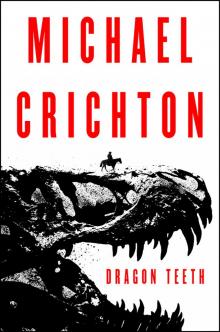 Dragon Teeth
Dragon Teeth Jurassic Park
Jurassic Park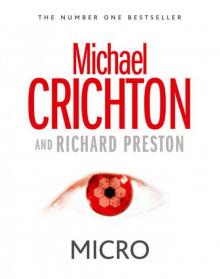 Micro
Micro The Great Train Robbery
The Great Train Robbery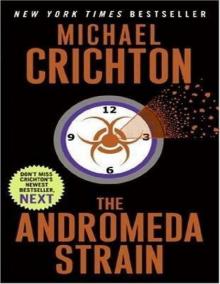 The Andromeda Strain
The Andromeda Strain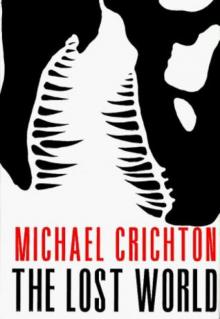 The Lost World
The Lost World Congo
Congo Travels
Travels Timeline
Timeline Sphere
Sphere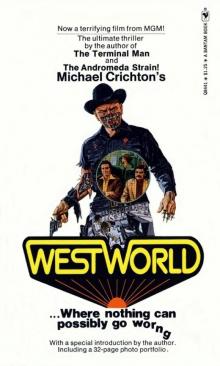 Westworld
Westworld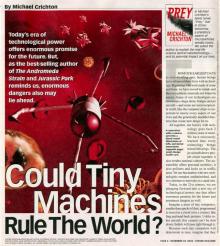 Prey
Prey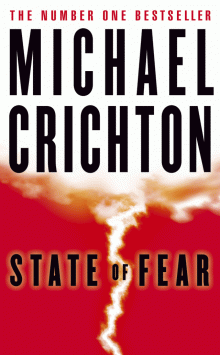 State Of Fear
State Of Fear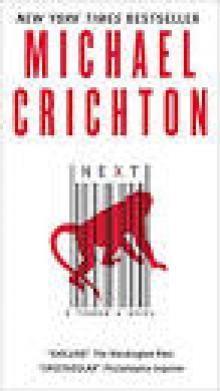 Next
Next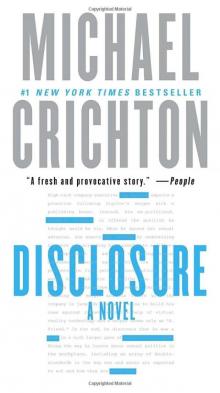 Disclosure
Disclosure Pirate Latitudes
Pirate Latitudes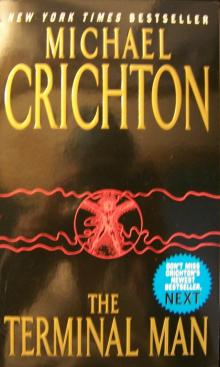 The Terminal Man
The Terminal Man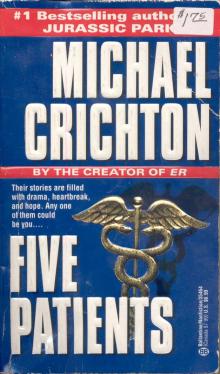 Five Patients
Five Patients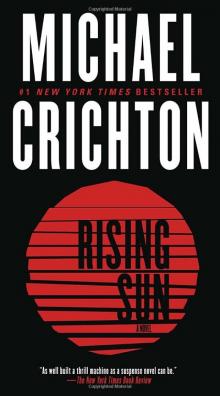 Rising Sun
Rising Sun Binary
Binary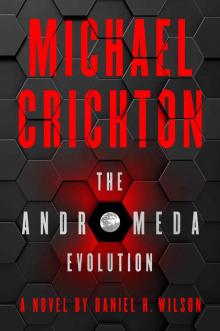 The Andromeda Evolution
The Andromeda Evolution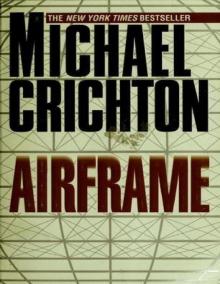 Airframe
Airframe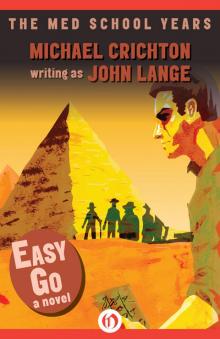 Easy Go
Easy Go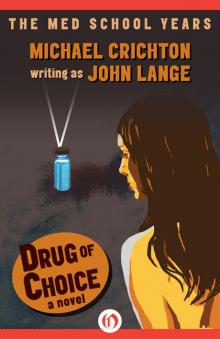 Drug of Choice
Drug of Choice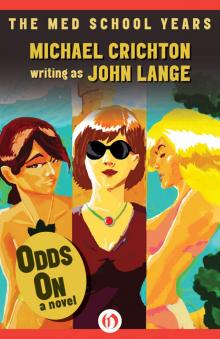 Odds On: A Novel
Odds On: A Novel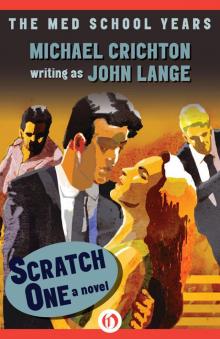 Scratch One
Scratch One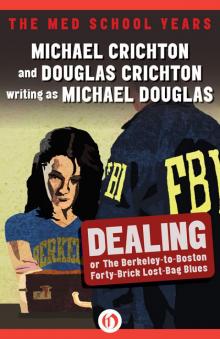 Dealing or The Berkeley-to-Boston Forty-Brick Lost-Bag Blues
Dealing or The Berkeley-to-Boston Forty-Brick Lost-Bag Blues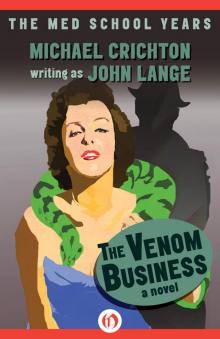 Venom Business
Venom Business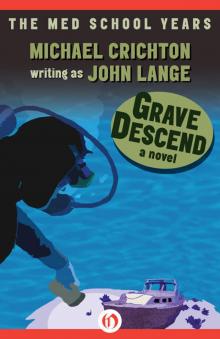 Grave Descend
Grave Descend Gold - Pirate Latitudes
Gold - Pirate Latitudes Binary: A Novel
Binary: A Novel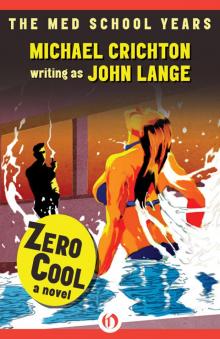 Zero Cool
Zero Cool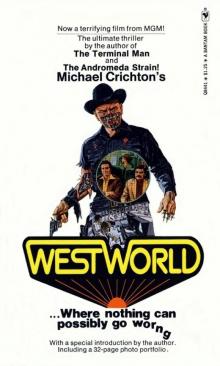 Delos 1 - Westworld
Delos 1 - Westworld